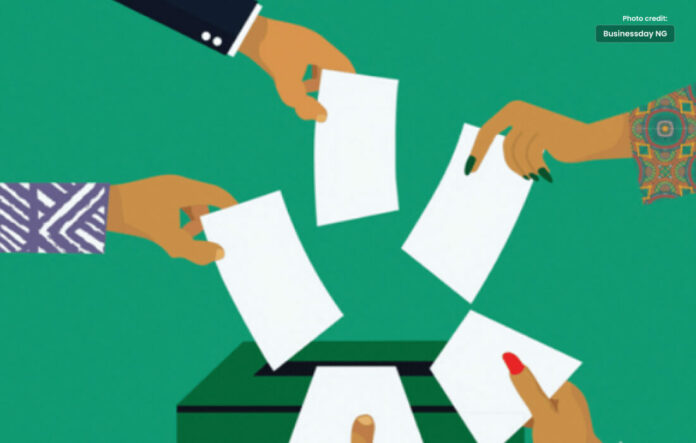Fraud is illegal interference with process of an election campaign.
Fraud is when there is unlawful meddling in an election campaign. Both in-person and absentee/mail-in voting are susceptible to election fraud. It may happen at any stage of the election procedure, from voter registration to ballot tallying.
Illegal money raised by those involved in leak market activities can once again be used and legitimized during the electoral process in Pakistan.
The use of such money would blur the political landscape while raising doubts about the credibility and transparency of the fragile democratic process.
Click here for the Latest news
The Election Commission’s political finance cell may seek limited legal recourse to stem the flow of money that may pose challenges to the integrity of the electoral system.
What is even more troubling is the lack of attention to a topic that fundamentally shapes the integrity of democracy in Pakistan. The lack of systematic research or studies on the economics of elections in our country is a matter of concern.
Due to the absence of relevant data, the journalistic work on this issue is only based on hearsay and speculation.
Some evidence supports the notion that such wealth flows into the electoral system from unknown sources. There is little oversight by the State Bank, the Election Commission of Pakistan or any other government agency or civil society platform on the transfer of campaign finance funds, leaving those seeking to understand the economics of elections Informal surveys and briefings have to be resorted to while interviews with relevant stakeholders are also conducted to get the facts.
Research for this report has revealed that the country’s savings pool, including banks, savings schemes, private fund management companies, real estate, etc, has seen an unusual increase during the five-yearly election cycles since 2008. Activity not found.
Money Transactions
While campaigning involves hiring printers, painters, advertisers, caterers, decorators, transporters, private jet operators, social media warriors, channel operators, commodity dealers, salaried workers etc. Thus a lot of money is transacted which increases the economic activity.
Efforts to get information from the State Bank were also unsuccessful. Privately, some bankers, on the condition of anonymity, have confirmed that there is no significant increase in the level of bank withdrawals now or in the 2018 elections after the announcement of the election date and the finalization of the nomination papers by the Election Commission. Not seen.
The statement of Director General of Central Directorate of National Savings Hamid Raza Khalid was also similar to the position of the bankers. Speaking on the phone from Islamabad, he said, “We have not seen an increase in the trend of withdrawing money from banks near the elections.”
Realtors and fund operators, when contacted, gave vague statements, but feedback from several people active in these sectors indicated a lack of urgency among those selling shares, along with slow business.
Responding to a question in this regard, Ahmad Bilal Mehboob, CEO of Pakistan Institute of Legislative Development and Transparency (PLDAT), expressed keen interest in the subject and recognized its importance.
He lamented the lack of research on the subject and stressed the need for increased laws governing the financial aspects of elections.
Rashid Chaudhry, National Coordinator of Free and Fair Election Network (FAFN), opined that ‘In the absence of a mechanism to trace and track the money trail of private election expenditure, which is estimated to run into billions of rupees, There is a strong impression that this money is being received from unknown sources.
Weaknesses in the Legal Framework
The Election Act sets expenditure limits for candidates seeking seats at the federal or provincial level, but it inadvertently creates loopholes in the legal framework that allow them to cross those limits without fear.
As per the election law, all candidates are required to open a separate election account while submitting their nomination papers. However, there is no restriction on disclosing the source of funds deposited in this account.
Legally, a candidate contesting for a seat in the National Assembly can spend up to one crore rupees in campaigning, while a limit of Rs 40 lakh has been set for a candidate in the provincial assemblies.
However, the Election Act exempts contesting candidates from the responsibility of accounting for all expenses incurred by others on their behalf.
Imagine that candidates for all 336 seats in the National Assembly adhere to the spending limit and there are only three candidates per constituency, then multiplying one crore rupees by 1008 candidates gives a staggering Rs 10 billion.
Money comes up. At this time, a total of 22,751 candidates will contest for seats in the national or provincial assemblies.
The final date of the elections is nearing and it seems that the Election Commission is busy, which is why it has not got time to ensure financial transparency and remove regulatory loopholes.
Despite contacting the Political Finance Wing of the Election Commission for their position, we could not get their response at the time of filing this report.
Islamabad-based development policy expert Zubair Faisal Abbasi was candid in explaining his point of view.
Also read this: Economy and Elections: Questions, Prospects and Concerns




